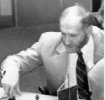


The story is that Bobby Fischer sometimes logs on to the Internet Chess Club (ICC) as a guest and plays an incredible series of blitz games against random opponents. The pattern is always the same: "Fischer", who does not have an ICC handle, will make contact either directly or through a third person and then play a series of very fast blitz games ("bullet chess"), using preposterous openings and whipping the living daylights out of his opponents. They are sworn to secrecy, so the games are seldom published. Only the stories of the apparition, of the bone-chilling encounter with the ephemeral chess legend remains.
All this was a chess-club story, until Nigel Short went public with his encounter with the mysterious ICC Fischer in the Telegraph last Sunday (9.9.01). Nigel revealed that he has played nearly 50 speed chess games against Fischer during the past year. "I am 99 per cent sure that I have been playing against the chess legend. It's tremendously exciting," he said. In October last year, in the first of their four confrontations, Nigel lost 0:8, although he is one of the world's best speed chess players. "In my opinion Fischer is a much stronger speed chess player than Kasparov, which is incredible when one considers that at 58 he is virtually a geriatric in terms of the modern game," Nigel said.
The final proof came when Nigel asked his mysterious opponent: "Do you know Armando Acevedo?" (an obscure Mexican player). The response was immediate: "Siegen 1970." Fischer had played Acevedo in the Siegen Chess Olympiad of 1970.
Okay, let's take a look at this piece of evidence first.
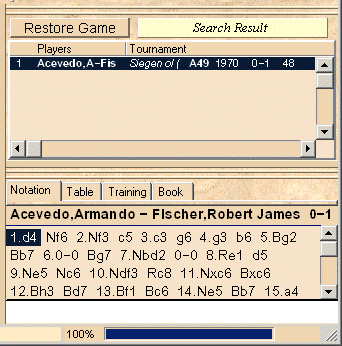
I have my ChessBase or Fritz program loaded.
I press Ctrl-F to get the search mask, type in Acevedo, Fischer.
Maybe I would have added "It was an A49 – Anti-King's Indian system with 1.d4 Nf6 2.Nf3 g6." or something to that effect.As an experienced user it would take me about ten to fifteen seconds to prepare the message. I have know Nigel since he was a child, and I can tell you this is what he means when he says "immediately".
Now let us look at the logic of the whole story. After his "rematch" against Spassky in 1992 Fischer cannot return to the United States, since the State Department had forbidden the match which broke the embargo imposed on Yugoslavia at the time. Fischer spent a number of years in Hungary, today he lives in Japan. Is it possible that from there he is fopping the Internet community?
The ICC Fischer usually starts his game with some really crazy moves, like 1.f3 d5 2.c3 Nf6 3.Kf2 e5 4.Ke3 or 1.e4 c5 2.Ke2 Nc6 3.Ke3. And he wins. Aha, obviously this points to two things: the ICC Fischer wants to avoid the main lines of modern chess theory, just as he has propagated with his Fischer Random Chess. Secondly the legendary Fischer is the only player with the god-like abilities to actually win such games against strong players – all the way up to a top professional like Nigel Short.
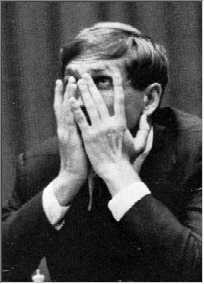
Bobby Fischer 1972 in Reykjavik

and 1992 in Sveti Stefan
Okay, we look at the logic of this second piece of evidence. Since his historic match against Boris Spassky in 1972 Fischer has only played 30 public games, in the 1992 rematch in Sveti and Beglrade. Do you believe that this man, now 58 years old, could suddenly resurface, and beat the strongest GMs in the world in lightning blitz games, after giving them a tremendous advantage in the opening? No, not beat them, tear them to pieces, wipe the floor with them. If you can believe this you must have great powers of credulity and faith.
But what is the alternative? Who else could be doing this? There is an obvious answer. Only a computer would be able to do what the mysterious ICC Fischer has done on the Internet. In fact it is exactly what you would expect from a fast, tactical program. You can easily try it out. Load Fritz, Junior, Shredder or Tiger, preferably on a 1.4 MHz or faster machine, force the first moves of the ICC Fischer player and then play on against the program. At three minute time controls. You can also jump into the sea off the Florida coast and pick a fight with the denizens swimming around there.
Personally I find it much easier to believe that Nigel Short and the rest are getting mauled by a very fast computer (and a very proficiet computer operator) than by a 58-year-old non-playing GM – however great and charismatic this player might have been thirty years ago. As to the question why on earth anyone would perpetrate such an eloborate hoax, I again have a pat answer: because it is fun! Can you imagine anything more entertaining than whipping Nigel Short, convincing him that he is getting licked by a ghost, and then having him publish it all in the Telegraph.
But not everbody gives up so easily. My old friend Tim Krabbé originally thought the ICC player was not Fischer. "Playing over these games, you get the impression that the mysterious guest is a fantastically strong player," wrote Tim in his Chess Diary (article 134). But he gives three reasons why the player cannot be Fischer after all:
The last point is tongue-in-cheek: Krabbé gives positions by three Jewish players who, deep in the game, had indeed moved their kings to the square f4 (Tim is a chess humourist).
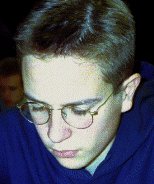 Now
Tim has had a change of heart and frankly says "I take back everything I said
and claim the opposite" (see Chess
Diary article 139). He has found convincing evidence that the ICC player
is not a computer. The evidence turned up in a series of 25 three-minute blitz
games that one 'Guest71' played on 24 April 2001 against 'Beber', the French
IM Robert Fontaine (right), who had then an ICC rating of 2827 (and a FIDE-rating
of 2452). guest71, always with absurd openings, won 20 games, lost 3, and two
games were drawn. For Tim the most interesting game was the following:
Now
Tim has had a change of heart and frankly says "I take back everything I said
and claim the opposite" (see Chess
Diary article 139). He has found convincing evidence that the ICC player
is not a computer. The evidence turned up in a series of 25 three-minute blitz
games that one 'Guest71' played on 24 April 2001 against 'Beber', the French
IM Robert Fontaine (right), who had then an ICC rating of 2827 (and a FIDE-rating
of 2452). guest71, always with absurd openings, won 20 games, lost 3, and two
games were drawn. For Tim the most interesting game was the following:
Guest71 – Beber, ICC 3 0, 2001: 1.e4 c5 2.Ke2 Nc6 3.Ke3 g6 4.Nc3 Nd4 5.d3 Nf6 6.Kd2 d5 7.Ke1 Bg7 8.h3 O-O 9.a3 e5 10.Bg5 Be6 11.exd5 Bxd5 12.Nxd5 Qxd5 13.c3 Ne6 14.Be3 Rad8 15.Qa4 e4 16.dxe4 Nxe4 17.Rc1 a6 18.Be2 b5 19.Qxa6 c4 20.Rd1 Qf5 21.Nf3 Nxc3 22.bxc3 Bxc3+ 23.Nd2 Nc5 24.Bxc5 Bxd2+ 25.Rxd2 Rxd2 26.Kxd2 Rd8+ 27.Kc1 Qe5.
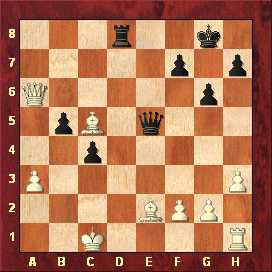
Tim Krabbé writes: "White is two Bishops up, but he cannot prevent a perpetual with 28...Qa1+ or, after 28.Kb1, with Qf5+ 29.Ka1 Qe5+. White played the surprising 28.Bxc4. At first, I thought this was a typical computer move. My computer programs do look at it, but finally they play 28.Qxb5 Qa1+ with a draw. However, there is also a typical human maxim for this kind of situation: "You can only take one at a time." So why not Bxc4? – after Qxc5, you have 29.Qxb5, and will remain a pawn up. What makes Bxc4 human too, is that it does not change the result: after 28...bxc4 29.Qb6 it's still a draw with Qa1+. It could just as well be a very human last attempt to let the opponent go wrong, and win a drawn game."
What do we say to that? Well, a quick check with all top engines does reveal that they will play 28.Qxb5, but if the operator is running in multiple variation mode he might well see the text move come up as the second or third best line.

In this example (on a 666 MHz computer) we can see that Deep Fritz sees at least two ways to draw the position. If I select the second line, and then start entering the black moves as played by Beber/Fontaine, Fritz duplicates every single move after that, all the way to the final mate: 28...Qc3+ 29.Kb1 bxc4 30.Rc1 Qb3+ 31.Ka1 Rd2 32.Qc8+ Kg7 33.Bf8+ Kf6 34.Qc6+ Kf5 35.Qc5+ Kf6 36.Qe7+ Kf5 37.Qxf7+ Kg5 38.Be7+ Kh6 39.Qf8+ Kh5 40.g4#.
A bit of further exploration reveals that some programs actually have 28.Bxc4 as their first line:

As you can see in the picture above Gambit Tiger (a good choice for the wild ICC Fischer games) switches to 28.Bxc4 after one second. It sticks with this move for as long as you care to let it run.
Tim has one more argument: "The ICC keeps this kind of game in their database, with times used for each move. When I looked at that, I was in for a surprise: guest71 never took more than 3 seconds for any move in that game, but 28.Bxc4 cost him 12 seconds."
Interesting. That means that he was probably using Deep Fritz in multi-variation mode, and paused to think about the options available at move 28. He may have even played through a few moves and decided that there were greater pitfalls after 28.Bxc4. Or he may have simply run through the first line to see the full draw (28.Qxb5 Qa1+ 29.Kc2 Qa2+ 30.Kc3 Qd2+ 31.Kxc4 Qxe2+ 32.Kb4 Qb2+ 33.Kc4 =), before deciding to go for the"other drawing line".
Finally it is entirely possible that our ICC Fischer is using a dual processor system and running multiple engines, choosing the move he thinks is most promising.

Deep Fritz and Gambit Tiger running in parallel, each giving its first move.
So what do we conclude? It could be that Bobby Fischer hath decended unto us to play miraculous games of chess. But Occams Razor forces at least the author of this piece to believe that ICC Fischer is a prankster using a fast computer and one or more of the top programs available today to create an urban legend that will stay alive in chess circles for a long time to come.
Games of ICC FischerWe give you some of the games by "Fischer" on the ICC. The first 24 are against "Beber", which is the handle of IM Robert Fontaine. The second set is against "Ural", who is IM Alexander Reprintsev (42), FIDE rating: 2428 (June 2001). You can replay the game on our Java boards. You can use the control buttons below the board or click the notation on the right, which will cause the board to follow. If you have any theories on the games, e.g. which program duplicates the moves of "Fischer" in a specific game, or if you have played any games yourself against the ICC Fischer, please contact us.. |
Frederic Friedel